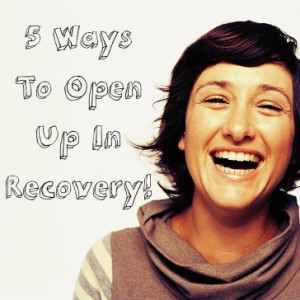5 Ways To Open Up In Recovery
It’s natural to feel resistant about going to rehab for your addiction. Seeking treatment means a whole world of new possibilities, many of which are frightening. You might fail the first time around. You might succeed and get sober only to realize you have no idea how to live without drugs or alcohol. These fears and resistance to going into rehab and therapy can make you want to clam up. Your best chance at successful recovery comes when you give yourself fully to the process, and this means opening up, sharing your weaknesses, and likely feeling vulnerable. Here’s how to get past your fears and misgivings and open up to your therapist and fellow recovering addicts.
5 Ways To Open Up In Addiction Recovery
 1. Commit To The Program
1. Commit To The Program
Despite all your reservations, fears and uncertainties, give yourself the best chance of success by committing to your treatment program from the beginning. If you go into rehab with a positive attitude and the willingness to do what it takes to get well, you will find it easier to open up to others as a part of your treatment.
2. Listen First
If you are feeling hesitant about opening up in therapy or group sessions, give yourself a little time to get comfortable. This is a completely new experience and you are out of your element. As you settle in, listen to those around you. Listen to your fellow patients opening up in group therapy. Absorb what they have to say and notice how the others react. No one is ridiculed for sharing personal stories and feelings, right? Listening to others will help you to realize that you are in a safe place and will help you feel comfortable about talking when it’s your turn.
3. Start A Journal
Opening up to others is a big step. Start with a baby step if you’re finding it difficult to do. Open up to yourself by writing down what you want to share with your therapist or your peers. As you begin to write down what you feel and what you have experienced, the task of saying these things aloud, and to others, will become easier to do.
4. Let Your Therapist Be Your Guide
You may not be asked to open up in a group session on the first day, but your counselor or therapist will want to hear from you in one-on-one talks right away. This may be easier than talking to a small group, but it’s still tough. Remember that your therapist is there to guide you through your treatment. Let her guide your sessions and what you talk about. The pressure is not all on you to decide what to say. Once you get going you may just find that you can’t stop talking.
5. Know When Not To Open Up
Your rehab facility, and especially your time with your therapist, should feel safe. While it’s natural to feel reluctant to speak up at first, you should be able to relax into the process of talking about yourself. If you just can’t do it, or your gut is telling you that something isn’t right, you might not be the problem. Not all programs or therapists are created equal. If you feel uncomfortable where you are, get out and find a program or a therapist that does feel right.
Opening up is never easy. When you have so much bottled-up shame and guilt because of your addiction, getting your feelings out in the open is both a challenge and a catharsis. Take steps toward opening up and you will reap the rewards of a true breakthrough.
See Our Other Posts With Helpful Recovery Tips – Recovery Is Possible!



